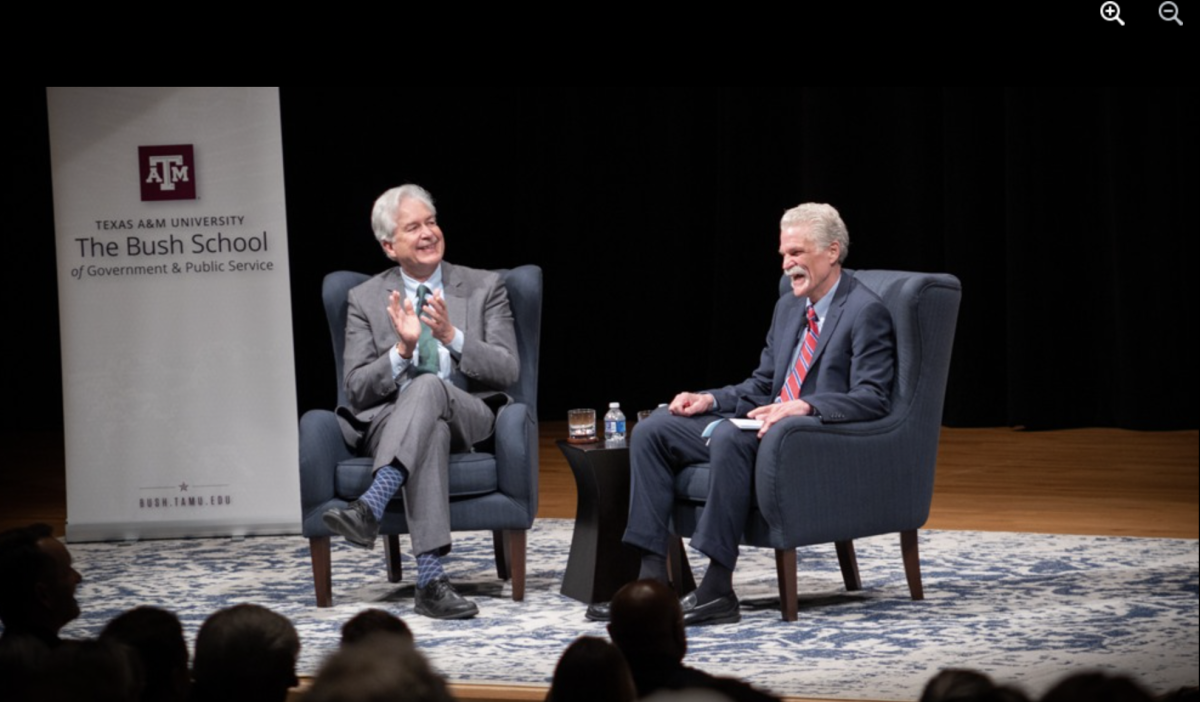CIA director Bill Burns visited Texas A&M to speak to students and staff about the CIA’s position on international affairs and how the agency is responding to evolving current events.
On April 12, Director Burns discussed the current geopolitical environment the agency and nation are facing at an event hosted by the Intelligence Studies Program and the Bush School of Government and Public Service.
Burns began his lecture by discussing the ongoing Russian invasion of Ukraine. When asked about how the Ukrainian situation started and where it is heading, Burns said grievance and ambition were the motives behind the invasion.
“[Russian President Vladimir Putin’s] two principal ambitions were to restore Russia as a great power after what he said to be a ‘decade of humiliation’ after the collapse of the Soviet Union and of course to establish himself as a great Russian leader,” Burns said. “In order to accomplish this, he had to do two things. One, create a sphere of influence where he could control the choices of his principal neighbors. Second was to create a very repressive, authoritarian ward of aggression.”
Continuing on why Russia invaded Ukraine back in 2014 and now in the present, Burns said a democratic and free Ukraine threatened the Russian president’s ambition.
“Over the last decade, [Putin] has seen a democratic Ukraine become very independent and moving more and more towards the west,” Burns said. “That has become a threat to that ambition and over the past few years, that view has harkened deeper in Putin’s mind.”
Discussing why the Russian government decided to launch their invasion last year, Burns said that it was due to strategic timing.
“Putin had convinced himself that strategically that his window of opportunity to establish control over Ukraine was beginning to close and tactically, he looked to the beginning of 2022 as a favorable time,” Burns said. “He thought that Ukraine was a weak and divided country, and that the Europeans and Americans were distracted and risk-averse and that the Russian military could achieve a quick and decisive victory at no cost. He thought that Ukraine was not a real country — well a real country fights back.”
Noting how the invasion has played out for the Russian government, Burns said to remember how it has been a disaster for the Russians and not to underestimate the Ukrainians.
“By any measure, this has already been a massive strategic failure for Russia, I mean look at the weakness of the Russian military that has been exposed and the losses of manpower and resources,” Burns said. “By any definition, this is a massive long goal for Russia as well.”
When asked about the Kremlin’s connection with China and what China’s intentions are in this situation, Burns said the partnership, while a significant one, could force Russia to become an economic colony of China.
“The Chinese are buying a lot of cheap energy from the Russians right now, they’re doing a lot of economic business as well and it seems that over the coming years, Russia runs the risk of becoming dependent on the Chinese market and Chinese technology,” Burns said. “ [Russia] is becoming an increasingly dependent junior partner in a way, it is a relationship that we watch very carefully.”
When discussing China, the moderator and Director of the Intelligence Studies Program at the Bush School Greg Vogle asked Burns about the possibility of China going after Taiwan. Director Burns said the CIA does not underestimate Chinese President Xi Jinping’s ambition to control Taiwan.
“[Xi] has publicly stated that his preference is to accomplish this short of the use of force,” Burns said. “The truth is today that President Xi and the Chinese military leadership have some doubts about whether they could accomplish a successful invasion of the island right now.”
Noting that nobody has been watching the Ukrainian conflict closer than Xi has, Burns said the experience had deepened those doubts about the Chinese capacity to invade Taiwan successfully. The Director also added that the risk of conflict is likely to grow over the course of this decade.
“We know that President Xi has instructed his military to be ready for such a conflict by 2027, the operative phrase is ‘be ready,’” Burns said. “It doesn’t mean that he’s made a decision to launch an invasion in 2027 or 2028 or 2026, but it does mean that the risks grow the further we get into this decade and beyond it.”
Switching gears over to how A&M students can join the CIA and what the agency is looking for, Burns noted the CIA is an incredible place to work for students who are interested in public service.
“We have taken steps to accelerate the onboarding process, the length and time it takes for an application to a final job offer,” Burns said. “When I became director, it took nearly two years to bring people into the door which is crazy. We have now reduced that by creating a modern digitized system for managing applications which puts us in a more competitive position. We had a backlog two years ago of nearly 10,000 applicants and now have cut that down to less than a 100.”
Burns said the CIA is focusing on prospective officers that have language skills or technology skills in either STEM subjects or anything else.
“These are a given in all the challenges that I have talked about before and are increasingly important to us, to our future as the world’s best intelligence service,” Burns said. “This is an opportunity to serve a cause bigger than one’s self, for this case the interests and values of our country, and if you’re really lucky to get the chance to play a very small role in history and sometimes a chance to shape it a bit as well.”









